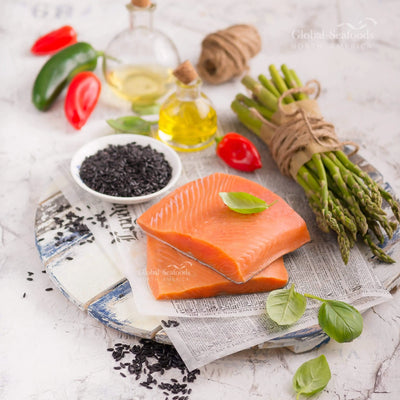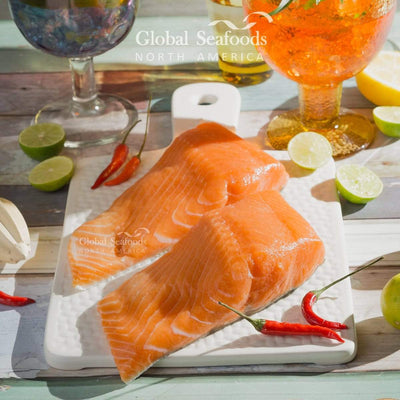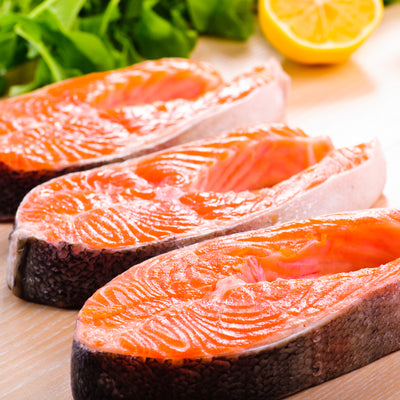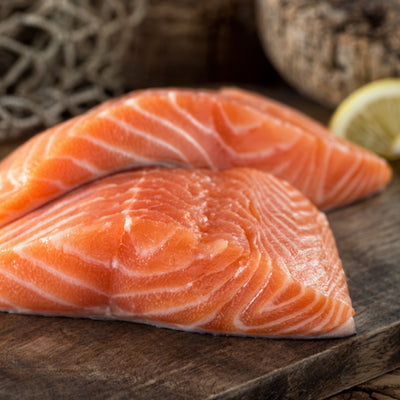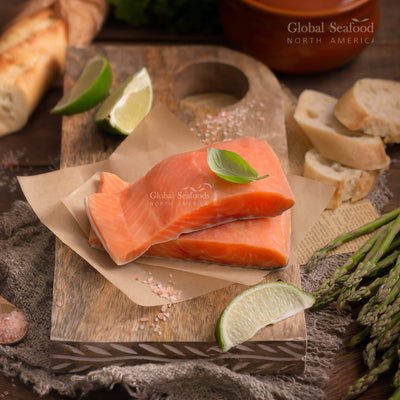The Environmental Impact of Salmon Farming & Sustainable Solutions

The Environmental Impact of Salmon Farming and Sustainable Solutions
Salmon farming has become one of the most significant sources of seafood production worldwide, meeting the rising demand for nutritious and omega-3-rich fish. However, concerns regarding the environmental impact of salmon farming have sparked debates about sustainability, habitat destruction, and ethical aquaculture practices.
This article explores the challenges of farmed salmon, ongoing sustainability initiatives, and how consumers can make informed choices when buying responsibly sourced salmon.
The Environmental Impact of Salmon Farming
1. Water Pollution from Open-Net Salmon Farms
A major environmental issue in industrial salmon farming is water pollution caused by open-net pens in coastal waters. These pens allow waste, uneaten feed, and chemical treatments to enter the surrounding marine ecosystem.
- Nutrient Overload: Excess nitrogen and phosphorus from fish waste lead to harmful algal blooms, which deplete oxygen and kill marine life.
- Seafloor Degradation: Salmon farm waste accumulates on the seafloor, creating oxygen-deprived dead zones, harmful to native species.
2. Disease Transmission and Antibiotic Use
Salmon are raised in high-density conditions, making them prone to diseases and parasite infestations like sea lice.
- Impact on Wild Salmon: Infected farmed salmon can transmit diseases and parasites to wild salmon populations, threatening their survival.
- Overuse of Antibiotics: To prevent disease outbreaks, many salmon farms use antibiotics and pesticides, which can contaminate water and lead to antibiotic-resistant bacteria.
3. Fish Escapes and Genetic Pollution
Escaped farmed salmon pose a significant threat to wild populations by competing for food and interbreeding with native fish, leading to genetic pollution.
- Case Study: In 2017, Washington State experienced a massive Atlantic salmon farm escape, raising concerns about ecosystem disruption and disease transmission.
- Impact on Wild Fish: Hybrid offspring from escaped salmon may have reduced survival instincts, making them vulnerable to predators and environmental stress.
4. Habitat Destruction and Overfishing for Feed
Industrial fish farming requires large amounts of feed, often sourced from wild fish stocks like herring, sardines, and anchovies.
- Overfishing of Small Fish: It takes 1.2 to 1.5 kg of wild fish to produce 1 kg of farmed salmon, putting pressure on marine food chains.
- Coastal Habitat Loss: The construction of salmon farms in mangroves and estuaries leads to habitat destruction, affecting biodiversity.
Sustainability Practices in Salmon Farming
1. Land-Based and Closed-Containment Aquaculture
To reduce pollution and disease transmission, new technologies like closed-containment salmon farms are being developed.
- Land-Based Recirculating Aquaculture Systems (RAS): These eliminate the risk of fish escapes and minimize pollution by recycling water.
- Offshore Deep-Water Farms: Moving farms further offshore reduces their environmental impact by dispersing waste more efficiently.
2. Natural Disease Control and Cleaner Fish
To reduce antibiotic use, farms are adopting natural solutions:
- Cleaner Fish: Wrasse and lumpfish are used to control sea lice populations without pesticides.
- Vaccines for Farmed Salmon: New vaccines help prevent disease outbreaks, reducing reliance on antibiotics.
3. Sustainable Salmon Feed Innovations
To decrease reliance on wild fishmeal, farms are switching to alternative feed sources:
- Algae-Based Omega-3: Rich in essential fatty acids, replacing fish oil.
- Insect Protein and Plant-Based Feeds: Lower environmental impact and reduce pressure on marine food stocks.
4. Certification Programs for Ethical Salmon Farming
Look for eco-certified farmed salmon to ensure responsible practices:
- Aquaculture Stewardship Council (ASC) – Supports environmentally friendly and socially responsible farming.
- Global Aquaculture Alliance (GAA) Best Aquaculture Practices (BAP) – Ensures sustainable seafood production.
Making Informed Choices: How to Buy Sustainable Salmon
1. Look for Sustainable Seafood Certifications
When buying farmed salmon, check for these sustainability labels:
✅ ASC-Certified Salmon
✅ BAP-Certified Salmon
✅ Wild-Caught Salmon from Certified Fisheries
2. Choose Responsibly Farmed or Wild Salmon
Not all farmed salmon is bad—some companies prioritize sustainable methods. Research brands that focus on responsible aquaculture practices.
3. Opt for Alternative Salmon Feed Sources
Support brands using plant-based, insect-based, or algae-based feeds instead of wild-caught fishmeal.
4. Reduce Food Waste
Store salmon properly, freeze portions if necessary, and consume responsibly to minimize waste.
Conclusion: Balancing Sustainability and Nutrition
While traditional salmon farming has negative environmental effects, the industry is evolving with sustainable aquaculture technologies. By supporting eco-friendly salmon farms, reducing chemical usage, and choosing sustainable feed options, consumers can play a role in promoting a healthier ocean.
As consumers, choosing responsibly sourced farmed salmon helps drive demand for sustainability. Whether opting for certified farmed salmon or wild-caught alternatives, making informed choices contributes to a more ethical seafood industry.
Shop Sustainable Salmon Options
📌 Buy Sockeye Salmon Fillets
📌 Buy King Salmon
📌 Buy Coho Salmon
📌 Buy Salmon Belly Strips
📌 Buy Chum Salmon
📌 Buy Copper River King Salmon
📌 Buy Silver Salmon
📺 Watch More on Seafood & Sustainability:
🔗 Global Seafoods YouTube Channel
Also in News

How to Make Sea Bream Sushi With Dry-Aged Tuna & Crab Roll — Step-by-Step With Chef Joshua
A complete guide to making Sea Bream sushi at home, including filleting, curing, slicing, and building a Dry-Aged Tuna & Crab sushi roll. Chef Joshua shares professional tips for restaurant-quality results.

Cooked Crab for Game Night: Everything You Need for a Perfect Seafood Party
Take your game night to the next level with a Cooked crab party. Learn the best recipes, cooking tips, and hosting hacks for a memorable seafood feast.

Steam Crab for Date Night: A Romantic Guide to the Perfect Seafood Feast
Make your next date night unforgettable with a romantic Steam crab experience. This guide covers everything you need to know, from ambiance to the best crab varieties.


